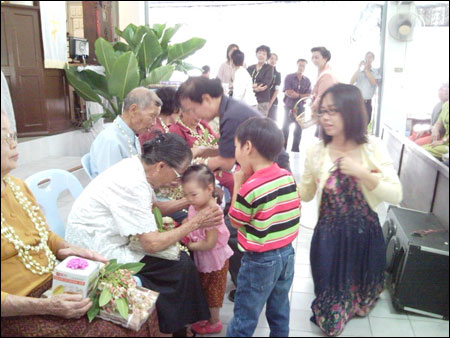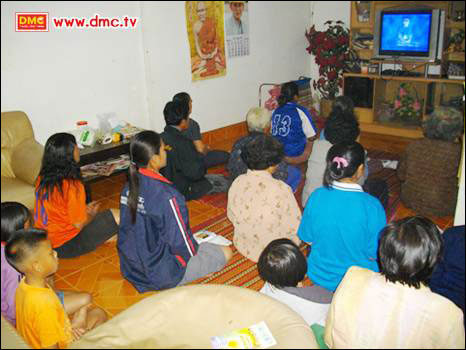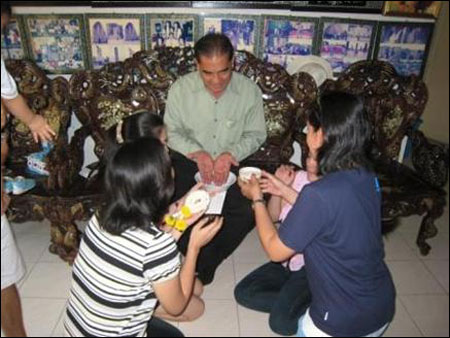Blessing Our Descendants #2
A blessing means the act of giving the very best.
The way to create the very best in oneself
The Lord Buddha taught the way to create the very best in oneself by eliminating greed, anger, and ignorance through the accumulation of merit. The elements of this way are:
1) Eliminating greed by regu7lar acts of generosity.
A good example can be seen in our ancestors. In those days, our ancestors would rise before dawn, and then wake their family to prepare the alms meal for the monks. The entire family had to get up and contribute. When the monks came to receive the alms offering. The grandparents would lead the children to put the meal offering into the monks, alms-bowls.
After the offering, the grandparents would show the grand parents would show their children how to transfer the merit to deceased relatives by pouring the water of dedication. In doing so, the children would be instilled with gratefulness and compassion.
In families who lived far from the temple, and were not part of the route for the monks’ alms round, the grandparents would ask their descendants to prepare food to offer to the monks, and they would travel to the temple to offer it there. If they could not travel due to illness, their children would go in their place. Before leaving the house, the grandparents would gather their descendants to make a resolution (wish).
Our ancestors wanted their children to be acquainted with generosity, rather than have minds that were clouded or full of greed. Waking in the early morning to perform a good deed refreshes the mind with this positive act. Life is short and full of uncertainties. Thus, everyone in the family should begin their day with a radiant mind that thinks only about supporting others to do more good deeds such as offering alms to the monks in the morning.
We can see that nowadays it is different. Most people to day wake up with a thought about getting ahead in their careers, how they can triumph onver others. Some have thoughts of deception throughout the entire day. Some always up late, unable to keep pace with others. These people do not perform a single good deed throughout their day, in addition to having gotten up late.
When these situations occur, the whole family is affected. When one member takes advantage of others at work, he can do the same to his own family. This situation can worsen when family members fight over property or money, This causes the decline of the very best in the family and problems can only increase.
Since our ancestors fully understood this fact, they led their descendants to offer alms to the monks every morning. This good deed commences the day. Children who are taught to b3e giving and supportive of others do not exhibit others; their minds become positive and radiant from the time the sun rises. Through this means, greed will be completely eliminated. Through generosity, the very best can be created in oneself.
2) Eliminating anger by observing the precepts regularly.
When the grandparents would wake at dawn, prior to preparing the alms meal, it would be their morning routine to gather the family and housemaids to do the morning chanting. After the chanting, they would continue by requesting the five precepts in front of the Buddha image (as His representative).
For family members who would wake up 10 minutes late, thereby missing the morning chanting, the grandparents would not allow it to pass; instead, everyone would request the five precepts while they waited for the minks to arrive for the alms of erring. After the alms offering, they would all dedicate the mirits they had just performed (alms offering and the intention of keeping the precepts) to their ancestors immediately. Then they would all do the morning chanting together. At this point, we can see that the grandparents tried to instill goodness in the family, not allowing the defilements to succeed.
The family would become acquainted with the intention of keeping the five precepts on a daily basis as a way to develop morality. They would make promises to themselves not to break the five precepts throughout the entire day. Moreover, they would not be ignorant, flirtatious, or cause trouble for others. Although some disagreements may have been unavoidable, no matter how serious the situation became, they would control themselves as best as they could and would reasonably settle the argument. Descendants who are taught well in childhood will not give in to temptations (Roads to Ruin) at all. By observing the five precepts they will live a peaceful life.
On the contrary, today’s society is filled with violence. When people are offended by others, they quickly reply with hostility. Their hot tempers are ready to erupt and seek revenge with others at anytime, leading to endless hatred.
With their wisdom and vision, our ancestors deeply understood this truth and its cause and effect. By teaching their families to have control over themselves at a young age, the grandparents instilled them with generosity through alms offerings to the monks and daily observance of the five precepts. These wholesome deeds transform into a moral foundation and discipline for the children. When they are able to refrain from exploiting themselves and others, through the observance of precepts, the very best can be created in themselves.
Parcticing meditation every night.
3) Eliminating ignorance by regularly practicing meditation.
As our ancestors studied and practiced the Dhamma, they knew that one’s mind could be easily trapped by the five forms of sensual desire: visual images, tasty foods, aromatic scents, melodious sounds, and objects soft to the touch. For instance, when one sees a good looking person or an attractive image, tastes delicious food, smells an aromatic scent, hears melodious sounds, and touches soft objects, one will have the desire to possess them.
Being trapped by the channels of the eye, nose, tongue, body and mind, one can easily mistake wrong for right and by convinced to do evil deeds. Later, one will be miserable when the consequences bear fruit.
Training ourselves to be mindful will save our minds from being trapped by those channels.
Mindfulness is being aware of what one is doing at the present moment, and being able to differentiate and being able to differentiate and make a judgment about what is right or wrong, good or bad, wholesome or unwholesome appropriate or inappropriate. Mindfulness protects one from recklessness.
Our ancestors were well aware of these truths, which is why they taught themselves to be mindful when they were young, They believed and followed the Lord Buddha’s teaching that the temple is a source of moral knowledge for the people.
The Lord Buddha taught the way to be mindful though a practice called mediation.
Meditation is the method to eliminate a wrong view by training one’s mind to come to a standstill until it becomes clear, pure, and radiant, enabling one to be firm in righteousness.
Our ancestors had trained themselves to be mindful before they got married; they continued to practice this as part of their routine in their old age. These three practices are:
1) Studying Dhamma every day.
2) Teaching Damma to their family every day.
3) Parcticing meditation every night.
By studying Damma every day, our ancestors were always reminded of the Lord Buddha’s teaching about never failing to make merit. Because everyone will die someday, the only things that we can bring with us to our next existence are merit (wholesome) and sin Cunwholesome). In one’s life, if one can accumulate more good deeds, problems can be reduced, and happiness will result. Conversely, if a person accumulates more evil deeds, he would not only have much trouble in life but also unhappiness.
By teaching Dhamma to their families every day, our ancestors were able to review the moral principles. When their children were taught morality, they became attached to Dhamma. They also enjoyed spending time with their grandparents because of reminders to do good deeds. In turn, the grandparents became respected by the children as the “perfect ones” in the family.
Practicing meditation every night was equivalent to mindfulness training. When they practiced meditation on a daily basis, their minds became acquainted with peacefulness always peaceful, they were not easily trapped by the channels of the five sensual desires. They could resist all kinds of temptations or unwholesome deeds.
For this reason, they were constantly mindful and did not indulge. They were clever and understood other people and their defilements. Knowing how to get rid of them. They were a source of wisdom to their family. Anyone who wished to gain the same knowledge was never disappointed; they just had to approach their grandparents to talk with them.
In conclusion, our ancestors were able to create the very best for themselves by eliminating greed, anger, and ignorance, and by practicing generosity, observing the precepts, and practicing meditation, Because they followed the Lord Buddha’s teachings, they became respectful, affectionate, and good role models for their families.
Having learned how our ancestors trained themselves to develop the very best for themselves, we can be assured that they were never neglected but were worthy of respect in their family, as the “perfect ones.”
The meaning of vara is progress and happiness.
How does the very best in oneself make a blessing holy?
When we approach elderly people of virtue and they give us a blessing, we may wonder why we feel a sense of its sacredness. We ask ourselves. “What does a blessing’s sacredness have to do with the very best qualities of the person who gives the blessing?”
A respected senior monk gave an explanation regarding this mater. He said.”A blessing’s sacredness” is dependent upon “how honest the blessing-giver is towards his virtues.”
If a blessing-giver is honest towards his virtues, his blessings will be very powerful. However, if a blessing-giver is not honest towards his virtues, his blessings will be less powerful.
He pointed out examples recorded during the Lord Buddha’s time, especially the story of Venerable Angulimala (Ahimsaka) vividly described in the Buddhist Canon. The respected senior monk illustrated:
“Before Venerable Angulimala ordained, he had been a serial killer. He had killed nearly a thousand people. The last or the 1,000 th person he was going to kill was his mother. However, the Lord Buddha foresaw this event, so He blocked him from committing the evil deed. When Venerable Angulimala saw Him, he thought about killing Him as well. Then the Lord Buddha tried to bring his senses back by reminding him of the evil deed in his mind. He gave him a particular sermon on the road side. In the end, Venerable Angulimala had repented and requested ordination as a monk from the Lord Buddha. When he became a monk, he conscientiously practiced Dhamma at His temple.
“As a result of being a famous killer in the past, when he went on his alms round in the morning in the beginning of his monkhood, he often came back with nothing because the villagers recognized him as the killer. Some ran away from him. Some threw stones at him until he was covered with blood.
“One day, while he was on his alms round, he met a pregnant woman who was nearing full term. As soon as she recognized him, she was overwhelmed with fright and tried to run away until she fell down and scrambled to stand again and again,
Eventually, she became exhausted and gaped at him in fear, as if she was dying in front of him.
“Venerable Angulimala really wanted to help her, but what he could do about it? In the end, he gave her a blessing based on his honesty towards his virtues:
“From the point of noble birth in having ordained in the Lord Buddha’s temple, I have never thought of exploiting or harming any living beings. With this truth, may you safely give birth to your child.”
“After his powerful blessing, the woman easily and safely delivered her child. Because the event occurred before Venerable Angulimala attained Arahantaship (the perfected one), it can be deduced that the power of the honesty towards his virtues created a holy blessing.
“Hence, the right method of giving a blessing is that it must be dependent on honesty towards the virtues of the blessing-giver.
“For example, if we are certain of our integrity regarding our generosity, we can bless a person in this way:
“With the truth of the alms I have offered to the monks all year long, may you have abundant provisions, Or based on the truth of offering my possessions to aid the monks, may you also possess wealth.”
The Respected Senior Mink’s Viewpoint
After the clear explanation, the respected senior monk shared his belief that:
“Those who become grandparents or are respected individuals must now prepare for a way to give a powerful blessing, should the occasion arise. Do not disappoint them with a blessing that sounds like they are listening to a parrot.
“If we have not offered alms to the monks yet, we should begin now because this wholesome deed can eliminate our stinginess. If we are easily irritated, strictly observing the precepts can eliminate bad tempers and stubbornness. Those who are still stubborn should study Dhamma and regularly practice meditation in order to develop the very best in themselves.
“However, if we have practiced generosity, observed the precepts, and regularly practiced meditation, we can depend on these wholesome deeds to create our holy blessing. For instance, you may say that, “May you receive the merits I have done and achieve prosperity, good health, and wisdom.”
“It is not too late for elderly individuals who lack good deeds to develop virtue by chanting the “Itpiso” 108 times or meditation all ninth. When children ask for our blessings the next morning, we will possess at least some good deeds; doing them within one night is better than having nothing to bless them with. But afterwards, we should do it regularly every day. In the end, their lives will be embraced with the very best.”
After studying this subject, readers should understand how to prepare themselves for the last chapter of life. It is like we have to pretend that we are old now in order to developourselves. Because when we become old, it is difficult to change our bad habits; so we must improve ourselves by ridding our minds of greed, anger, and ignorance. When the last chapter of life arrives, we will be ready to become a person worthy of respect to our own descendants. We will be a source of wisdom for them to study and follow.
Meditation - Related Articles
" />
" />
" />
" />
" />
" />
" />
" />
" />
" />
" />
" />








